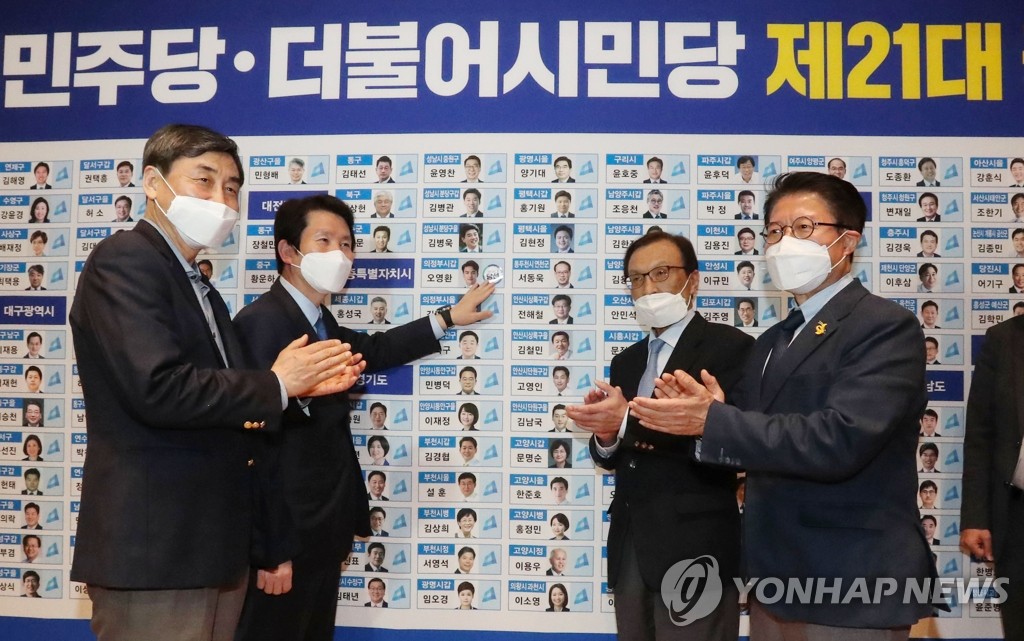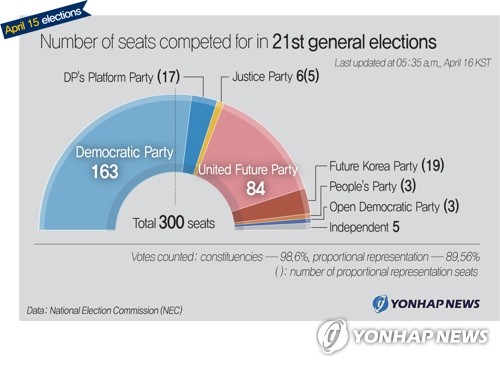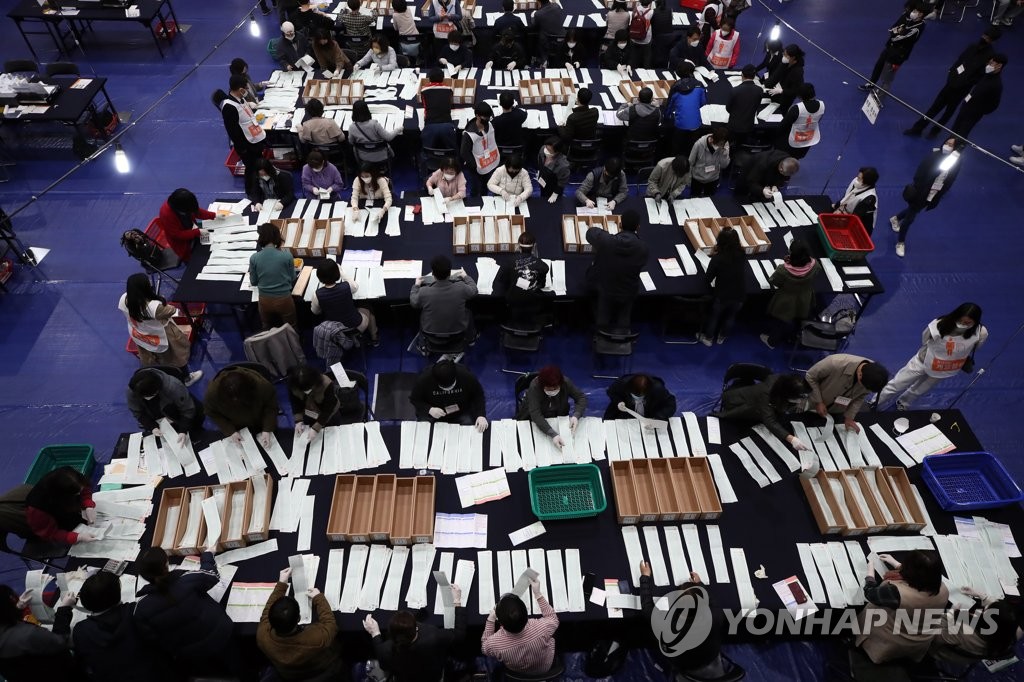- California Assembly OKs highest minimum wage in nation
- S. Korea unveils first graphic cigarette warnings
- US joins with South Korea, Japan in bid to deter North Korea
- LPGA golfer Chun In-gee finally back in action
- S. Korea won’t be top seed in final World Cup qualification round
- US men’s soccer misses 2nd straight Olympics
- US back on track in qualifying with 4-0 win over Guatemala
- High-intensity workout injuries spawn cottage industry
- CDC expands range of Zika mosquitoes into parts of Northeast
- Who knew? ‘The Walking Dead’ is helping families connect
Ruling party wins landslide in parliamentary elections amid pandemic
President Moon Jae-in’s ruling party clinched a landslide victory in parliamentary elections, which is set to give it an upper hand in pushing ahead with its agenda as the country faces a virus pandemic and an economic slowdown.
In the quadrennial election, held as scheduled on Wednesday despite the coronavirus pandemic, the Democratic Party (DP) and its satellite group secured a combined 180 seats in the 300-seat unicameral National Assembly, according to data from the National Election Commission (NEC) on Thursday.
This is nearly double the 103 seats obtained by the main opposition United Future Party (UFP) and its sister party. It also marks the biggest majority any party has claimed since the country’s transition to democracy in 1987.



This photo, taken on April 15, 2020, shows officials of the Democratic Party and its satellite party posing in front of a board at the National Assembly in Seoul showing seats the parties have secured in the general elections. (Yonhap)
Of the 253 directly contested seats, the DP won 163 seats, followed by the UFP with 84 seats, the liberal Justice Party with one seat, and independent candidates with five seats.
Of the 47 proportional representation slots, the parties affiliated with the UFP and DP secured 19 and 17 seats, respectively. The Justice Party won five seats, while the People’s Party and the Open Democratic Party got three seats each, according to the election watchdog.
The elections, held in the midst of South Korea’s battle against COVID-19, was seen as a referendum on President Moon, who has two more years in office.
Moon’s approval rating fell to the 30 percent level at one point last year, hit by a prolonged economic slowdown and a political scandal involving former Justice Minister Cho Kuk.
But the government’s handling of the coronavirus crisis has changed public sentiment, as illustrated in recent polls in which Moon’s approval rating shot up to over 50 percent.
South Korea has reported a caseload of 10,613 since its first infection on Jan. 20. It recorded fewer than 30 new virus cases on Thursday for the fourth straight day.
The DP’s victory will enable Moon to manage state affairs stably during the rest of his single, five-year term. It will prop up Moon’s reform initiatives, including the reform of the prosecution.
With 180 seats, the ruling bloc would be able to fast-track the passage of bills without support from other parties.
Observers say it would be capable of “doing everything” in parliament except constitutional revision, which requires at least 200 votes on the floor.
It would enable the DP to avoid political squabbles in pushing for key reform bills, unlike during the outgoing session of the National Assembly.
The general elections, one of the world’s first elections to be held amid the coronavirus pandemic, was carried out with extra precautions.
The election watchdog prioritized safety to prevent potential exposure to the risk of infection.
Voters wearing face masks had their temperatures checked at the entrance. They disinfected their hands with sanitizers and put on plastic gloves before casting ballots. To keep social distancing rules, voters were advised to stand at least 1 meter apart from others.
Voter turnout was confirmed at 66.2 percent, the same as the provisional turnout and the highest in 28 years, the NEC said. Despite the virus, more than 29 million people cast ballots. Turnout in early voting also hit a record 26.7 percent.
“(I feel) heavy responsibility prior to the joy of victory when seeing the election results,” DP chairman Lee Hae-chan said in a meeting at the National Assembly on Thursday. “(We) will beat the national crisis (coming from) the new coronavirus, with an exemplary attitude, and preemptively and actively cope with the crisis that threatens people’s livelihoods and the national economy.”
Among notable DP winners were Lee Nak-yon, the former prime minister who co-spearheaded the ruling party’s election campaign. Lee beat UFP heavyweight Hwang Kyo-ahn in the politically symbolic constituency of Jongno in central Seoul, effectively solidifying his stature as a strong presidential candidate.
The UFP, meanwhile, suffered a painstaking blow, marking its third straight defeat in elections held since the 2017 ouster of conservative President Park Geun-hye over a massive corruption scandal.
The conservative party failed to win over voters, though it highlighted the government’s failure to prop up the economy and stressed the need to keep the DP in check.
Party leader Hwang resigned from the chairmanship to take responsibility for the UFP’s defeat.
Kim Chong-in, the veteran politician who helped shape the conservative bloc’s campaign, apologized over the result.
“I acknowledge that the UFP’s change (in attitude) was insufficient. I feel apologetic for asking (the voters) to support a party that did not have the basics right.”
At the same time, he asked the people to support the embattled party.
“Even if (the party) is insufficient and not likable, (people) need to keep the main opposition party alive for the country’s future. I sincerely ask so.”












